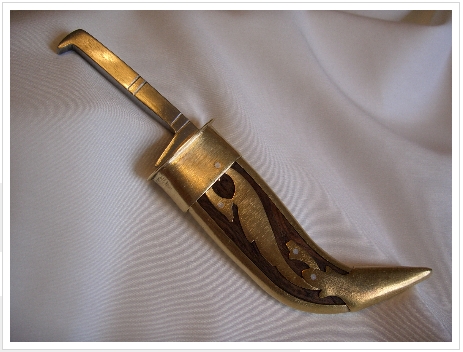 The Obama administration is not the only government to have come under fire from its critics for abusing the religious liberty of its citizens. Italy has refused to recognize Sikhism as a religion and denied Sikhs the right to practice their faith reports La Stampa, the Turin-based Italian daily newspaper.
The Obama administration is not the only government to have come under fire from its critics for abusing the religious liberty of its citizens. Italy has refused to recognize Sikhism as a religion and denied Sikhs the right to practice their faith reports La Stampa, the Turin-based Italian daily newspaper.
A great religious liberty story, but is it true? The framing of the 23 July 2012 article entitled “Il pugnale sacro che fa litigare Italia e sikh” by La Stampa might well cause the reader to assume that the Minister of the Interior ‘s decision not to carve out a religious exemption from the country’s weapons laws to allow Sikhs to carry in public a Kirpan — a ceremonial dagger — served as a ban to the public profession of faith for its adherents. Yet, the story neglects to say what non-recognition by the state means. Nor are we told how this took place.
There is much cry and no wool in this article. No context and only one side of the dispute is offered. Let me walk you through the story and show you what I mean.
Worldcrunch, an invaluable website that has translations and paraphrases of non-English language news stories, has recast the lede for the La Stampa story from:
E’ un pericolo andare in giro con un coltellino da boyscout o con una delle piccole lame multiuso svizzere? Per il ministero dell’Interno in caso di questioni di culto si tratta di armi improprie e per questo ha negato ai sikh in Italia il riconoscimento della loro religione.
into:
Should a boy scout walking around with a Swiss-army knife be considered dangerous? Should Swiss-army knives be banned altogether? Well, for the Italian interior minister, if the small knife is carried for religious reasons, then the answer is yes.
Last May, after years of court cases and appeals, the interior minister announced that it was refusing to recognize Sikhism as a religion, on the grounds that the kirpan, the small ceremonial dagger that Sikhs must carry at all times, is dangerous.
That is not quite what the lede says in Italian — but the gist is correct, and for consistencies sake I will work from the Worldcrunch translation. The article is laid out in traditional style, with comments from a leader of the Sikh community followed by a those of an Italian politician who has tried to intercede on behalf of the Sikhs. The politician’s encomium for his Sikh constituents is priceless:
” … They are the pillars of the production of the Parmesan cheese, just to give an example,” says Andrea Sarubbi, a member of parliament with the center-left Democratic Party …
 However, the Sikh contribution to the Italian semi-hard cheese industry appears not to have persuaded the government to overlook the problem of the kirpan. La Stampa states:
However, the Sikh contribution to the Italian semi-hard cheese industry appears not to have persuaded the government to overlook the problem of the kirpan. La Stampa states:
Sikhs have to follow many rules. Men cannot cut their hair and must cover their heads with turbans. They also have to carry a comb, which is a sign of cleanness, traditional pants, a steel bracelet — and the much disputed kirpan dagger.
The turban has also been an issue in the past. The Italian Interior Ministry only authorized its use in official ID photos in 1995. Even if, once in a while, there are some problems at airport security checks, the issue of the turban is considered settled.
But this is not the case for the ceremonial dagger. After a first refusal from the interior ministry, Italy’s main administrative and judiciary body, the state council, confirmed that the kirpan was illegal in June 2010. In August 2011, Sikhs appealed, pointing out that the dagger was only carried under the belt, and could not be drawn. Moreover their religion does not require a specific length and so the knife can be shorter than 4 centimetres – so as not to be considered a weapon. Last May, the ministry rejected these objections.
The article closes with comments from the Italian Sikh leader asking for respect and further words of wisdom from the Italian politician.
“A multicultural society has to face the dimension of the different faiths. They are difficult challenges but they cannot be avoided. They exist and need solutions,” says Sarubbi.
As it has been crafted, this article gives but one side of the story. No explanation is offered as to why the state acted as it did. Nor is there an explanation of what non-recognition means. The story is also context free. Islam, for example, is not a recognized religion in Italy. In 2010 the AKI news service reported the government had declined to add Islam to the list of faiths eligible to receive state financial support from income tax revenue.
Did the Sikhs seek a share of income tax revenue and were turned down? Was this solely an issue having to do with the kirpan? It is difficult to say what happened with precision because so much is missing from the story.Mosques in Italy will not receive a share of income tax revenue the Italian government allocates to religious faiths each year. Hindu and Buddhist temples, Greek Orthodox churches and Jehovah’s Witnesses will be eligible for the funds, according to a bill approved by the Italian cabinet in May and still must be approved by parliament.
Until now, the government had earmarked 8 percent of income tax revenue for Italy’s established churches. The great majority of these funds go to the Catholic Church, although if they wish, individual tax payers may elect to give the money to charities and cultural projects instead.
....
Islam is not an established religion in Italy and there is only one official mosque in the country, Rome’s Grand Mosque (photo). Politicians from the ruling coalition cite radical imams, polygamy and failure to uphold women’s rights by Muslims immigrants as obstacles to recognising Islam as an official religion in Italy.
Until now, only the Catholic Church, Judaism and other established churches including Lutherans, Evangelists, Waldensians and 7th-day Adventists have received the income tax revenue from the Italian government.
The collision of Sikhs and the state in the West over the kirpan and the turban has been an on-going topic for years. But the bottom line with this story is that sufficient information is not provided for a reader to understand the dispute. While the religious explanation for wearing the kirpan is provided, the secular argument against possession of weapons in public is not. And is it fair to say that Italian government’s refusal to give an exemption to Sikhs to allow them to wear a kirpan amounts to a prohibition of their faith?
What say you Get Religion readers? Doth this article protest too much? Is this a case of the violation of religious liberty? Is it a fair report on the controversy?

